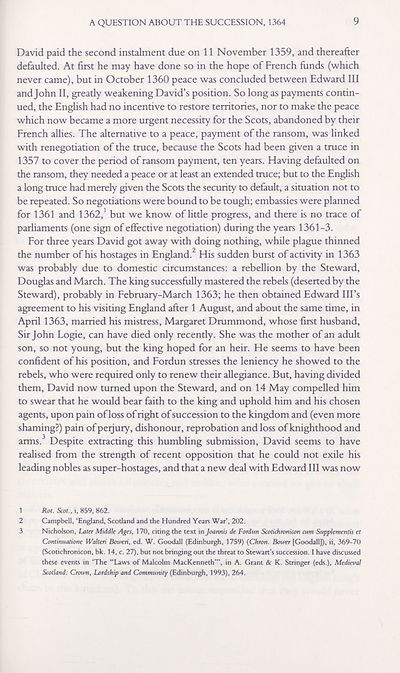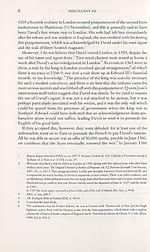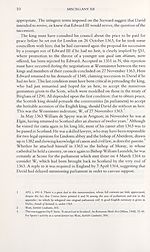Download files
Complete book:
Individual page:
Thumbnail gallery: Grid view | List view

A QUESTION ABOUT THE SUCCESSION, 1364
9
David paid the second instalment due on 11 November 1359, and thereafter
defaulted. At first he may have done so in the hope of French funds (which
never came), but in October 1360 peace was concluded between Edward III
and John II, gready weakening David’s position. So long as payments contin¬
ued, the English had no incentive to restore territories, nor to make the peace
which now became a more urgent necessity for the Scots, abandoned by their
French allies. The alternative to a peace, payment of the ransom, was linked
with renegotiation of the truce, because the Scots had been given a truce in
1357 to cover the period of ransom payment, ten years. Having defaulted on
the ransom, they needed a peace or at least an extended truce; but to the English
a long tmce had merely given the Scots the security to default, a situation not to
be repeated. So negotiations were bound to be tough; embassies were planned
for 1361 and 1362,1 but we know of litde progress, and there is no trace of
parliaments (one sign of effective negotiation) during the years 1361-3.
For three yean David got away with doing nothing, while plague thinned
the number of his hostages in England.2 His sudden bunt of activity in 1363
was probably due to domestic circumstances: a rebellion by the Steward,
Douglas and March. The king successfully mastered the rebels (deserted by the
Steward), probably in February-March 1363; he then obtained Edward Ill’s
agreement to his visiting England after 1 August, and about the same time, in
April 1363, married his mistress, Margaret Drummond, whose fint husband.
Sir John Logie, can have died only recently. She was the mother of an adult
son, so not young, but the king hoped for an heir. He seems to have been
confident of his position, and Fordun stresses the leniency he showed to the
rebels, who were required only to renew their allegiance. But, having divided
them, David now turned upon the Steward, and on 14 May compelled him
to swear that he would bear faith to the king and uphold him and his chosen
agents, upon pain of loss of right of succession to the kingdom and (even more
shaming?) pain of perjury, dishonour, reprobation and loss of knighthood and
arms. Despite extracting this humbling submission, David seems to have
realised from the strength of recent opposition that he could not exile his
leading nobles as super-hostages, and that a new deal with Edward III was now
1 Rot. Scot., i, 859,862.
2 Campbell, ‘England, Scotland and the Hundred Yean War’, 202.
3 Nicholson, Later Middle Ages, 170, citing the text in Joannis de Fordun Scotichronicon atm Supplements et
Continuatione Wallen Bouvri, ed. W. Goodall (Edinburgh, 1759) (Chron. Bower [Goodall]), ii, 369-70
(Scotichronicon, bk. 14, c. 27), but not bringing out the threat to Stewart’s succession. 1 have discussed
these events in ‘The “Laws of Malcolm MacKenneth”’, in A. Grant Sc K. Stringer (eds.), Medieval
Scotland: Crown, Lordship and Community (Edinburgh, 1993), 264.
9
David paid the second instalment due on 11 November 1359, and thereafter
defaulted. At first he may have done so in the hope of French funds (which
never came), but in October 1360 peace was concluded between Edward III
and John II, gready weakening David’s position. So long as payments contin¬
ued, the English had no incentive to restore territories, nor to make the peace
which now became a more urgent necessity for the Scots, abandoned by their
French allies. The alternative to a peace, payment of the ransom, was linked
with renegotiation of the truce, because the Scots had been given a truce in
1357 to cover the period of ransom payment, ten years. Having defaulted on
the ransom, they needed a peace or at least an extended truce; but to the English
a long tmce had merely given the Scots the security to default, a situation not to
be repeated. So negotiations were bound to be tough; embassies were planned
for 1361 and 1362,1 but we know of litde progress, and there is no trace of
parliaments (one sign of effective negotiation) during the years 1361-3.
For three yean David got away with doing nothing, while plague thinned
the number of his hostages in England.2 His sudden bunt of activity in 1363
was probably due to domestic circumstances: a rebellion by the Steward,
Douglas and March. The king successfully mastered the rebels (deserted by the
Steward), probably in February-March 1363; he then obtained Edward Ill’s
agreement to his visiting England after 1 August, and about the same time, in
April 1363, married his mistress, Margaret Drummond, whose fint husband.
Sir John Logie, can have died only recently. She was the mother of an adult
son, so not young, but the king hoped for an heir. He seems to have been
confident of his position, and Fordun stresses the leniency he showed to the
rebels, who were required only to renew their allegiance. But, having divided
them, David now turned upon the Steward, and on 14 May compelled him
to swear that he would bear faith to the king and uphold him and his chosen
agents, upon pain of loss of right of succession to the kingdom and (even more
shaming?) pain of perjury, dishonour, reprobation and loss of knighthood and
arms. Despite extracting this humbling submission, David seems to have
realised from the strength of recent opposition that he could not exile his
leading nobles as super-hostages, and that a new deal with Edward III was now
1 Rot. Scot., i, 859,862.
2 Campbell, ‘England, Scotland and the Hundred Yean War’, 202.
3 Nicholson, Later Middle Ages, 170, citing the text in Joannis de Fordun Scotichronicon atm Supplements et
Continuatione Wallen Bouvri, ed. W. Goodall (Edinburgh, 1759) (Chron. Bower [Goodall]), ii, 369-70
(Scotichronicon, bk. 14, c. 27), but not bringing out the threat to Stewart’s succession. 1 have discussed
these events in ‘The “Laws of Malcolm MacKenneth”’, in A. Grant Sc K. Stringer (eds.), Medieval
Scotland: Crown, Lordship and Community (Edinburgh, 1993), 264.
Set display mode to:
![]() Universal Viewer |
Universal Viewer | ![]() Mirador |
Large image | Transcription
Mirador |
Large image | Transcription
Images and transcriptions on this page, including medium image downloads, may be used under the Creative Commons Attribution 4.0 International Licence unless otherwise stated. ![]()
| Scottish History Society volumes > Series 5 > Miscellany of the Scottish History Society, Volume 12 > (20) Page 9 |
|---|
| Permanent URL | https://digital.nls.uk/127339041 |
|---|
| Description | Over 180 volumes, published by the Scottish History Society, containing original sources on Scotland's history and people. With a wide range of subjects, the books collectively cover all periods from the 12th to 20th centuries, and reflect changing trends in Scottish history. Sources are accompanied by scholarly interpretation, references and bibliographies. Volumes are usually published annually, and more digitised volumes will be added as they become available. |
|---|


